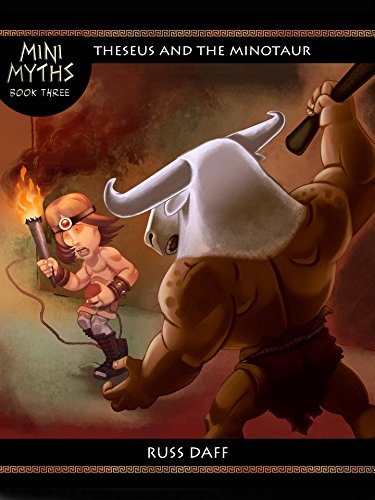Title of the work
Country of the First Edition
Country/countries of popularity
Original Language
First Edition Date
First Edition Details
Russ Daff, Mini Myth Book Three: Theseus and the Minotaur. RD Books, 2017, 38 pp.
ISBN
Genre
Adaptations
Comics (Graphic works)
Myths
Target Audience
Children
Cover

Cover courtesy of the Author.
Author of the Entry:
Ayelet Peer, Bar-Ilan University, ayelet.peer@gmail.com
Peer-reviewer of the Entry:
Lisa Maurice, Bar-Ilan University, lisa.maurice@biu.ac.il
Susan Deacy, University of Roehampton, s.deacy@roehampton.ac.uk

Russ Daff (Author, Illustrator)
Russ is a British author and illustrator from Cambridge, UK. He graduated from Falmouth School of Art in 1993 and he works for the computer games industry as well as creating illustrations and cartoons.
Source:
Profile at cambridge-illustrators.co.uk (accessed: July 19, 2019).
Bio prepared by Ayelet Peer, Bar-Ilan University, ayelet.peer@gmail.com
Summary
This is the third book in Russ Daff’s Mini Myth series, which retells myths in comic form for children. In this book, Theseus is leading a group of young men who fight bandits and monsters. When they return to Athens, he hears about the horrible tribute Athens must pay to Crete. Theseus volunteers to go to Crete and save his kingdom. Ariadne, who is under Aphrodite’s love spell, helps Theseus to find his way in the labyrinth. Theseus then kills the Minotaur and the group escapes to Crete with the help of Ariadne.
Each book in the series opens and ends with an illustration of the Sphinx, although it is not clear whether she is the narrator of the stories. Since she states that she eats humans (and a headless body is even depicted near her), she is a rather gruesome figure. This is, however, the scariest part of each book.
Analysis
The stories in this book are told with a humorous and lighthearted tone.
The book opens with an account of Theseus “and his gang of thrill seekers”. This description reveals the author’s opinion of the heroes, as thirsting for adventures; he also describes them as acting recklessly and picking fights with bandits and monsters. Giving him a “gang” is intriguing and also damages his mythological reputation, since the mythological Theseus was known for accomplishing his heroic acts alone. Hence Theseus and his group appear less heroic but more reckless and as purposely looking for trouble. As in the first book, which covered the adventures of Perseus, the gang’s fighting is described as ”fun” which raises questions regarding their heroism; are they heroic for fighting ruffians or not, since they do it for their own amusement?
The author has adapted the myths to suit the juvenile audience by avoiding any specific sexual reference. Thus, for example, Pasiphae is miraculously pregnant, due to Poseidon’s punishment, and delivers the Minotaur, but there is no mentioning of her coupling with the bull. In contrast to earlier books, the attitude to the gods is negative in this story. They are not benevolent but petty and quick to punish the humans for their error or lack of respect. In the previous books, for example, when Perseus fought Medusa, the assistance of the gods and their guidance was significant to the development of the plot and the construction of Perseus as a hero. Perseus’ piety was an important part of his heroism. In this story, however, the gods’ conduct effects humans in negative ways, such as through the creation of the Minotaur. Theseus overcomes the monster by using his strength and the help of Ariadne and the gods do not interfere.
Perhaps the author wished to show in the series that the gods can be ambiguous; they can be benevolent and helpful yet at the same time fierce and harsh to humans and therefore they should always be respected (in the ancient mythological world). However, at the end of the story, the gods redeem their former treatment of mortals by forgiving the humans and soliciting peace on earth. The gods take a very active role in the story in helping the mortals and guiding them and in judging the value of their actions and of course punish them. The mortal heroes remain just, without any flaws or faults at all.
The story ends with a serene scene of peace on earth, achieved by divine intervention. When mankind and the gods cooperate, the results are peace and harmony. It is difficult to tell whether the author refers to modern religion or and just uses the ancient mythological gods to promote such harmony, yet there is no doubt that piety is a recurring motifs in the series.
As in the previous book, there are some attempts to insert contemporary feminist attitudes, when Theseus claims that the girls who are leaving for Crete are braver than the boys. There is also an attempt at ethnic inclusivity, in that the illustration shows a coloured girl among the group. Aphrodite is sent to cast a spell on Ariadne so that she will assist Theseus. This repeats the motif of the previous book where Aphrodite made Perseus and Andromeda fall in love. This raises questions regarding the nature of true "love" in this context. It shows that the mythological love was also part of the gods’ machinations, yet humans could also choose their own path. For example, Perseus and Andromeda remain a couple while Theseus and Ariadne do not, in spite this godly intervention.
The author also makes a change that removes all blame from Theseus for abandoning Ariadne; the gods praise Ariadne’s actions, and, as a result, Zeus decides that Ariadne shall not be a mere princess but the wife of a god, and that she would tame the unruly Dionysus. Therefore, Zeus is responsible for the forsaking of Ariadne on Naxos, rather than Theseus. It is even stated that Theseus wants to marry Ariadne despite their repeated disagreements. As in his previous books, the author does not wish to present any imperfections in his heroic mortals, instead making the gods responsible for everything.
Addenda
The review refers to the Kindle edition.


